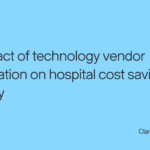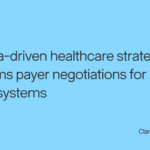Recently, Clarify Health‘s CEO Terry Boch moderated a panel during an event at AHIP 2024, focused on engagement between health plans and providers. Formerly known as America’s Health Insurance Plans, AHIP is a professional advocacy association for providers of health care coverage, services, and solutions; its annual flagship conference has been a destination for industry leaders for decades. The discussion included Blue Cross-Blue Shield of Rhode Island’s Senior VP of Value-Based Care, Contracting, Data & Analytics Nick Lefeber; and Elevance’s VP of Value-Based Solutions, Strategy, and Planning, Abby Malloy. Boch, Lefeber, and Malloy shared their insights on building robust provider relationships, leveraging data, and fostering collaboration — all in the interest of blazing new trails in the realm of contemporary healthcare. Boch kicked off the conversation by suggesting we can examine today’s healthcare ecosystem through three “lenses”: One, understanding perceptions in the market and building strong provider relationships; two, identifying and sharing best practices with colleagues; and three, “powering innovation to really move the needle and utilize provider engagement.” Here’s a deep dive into their conversation and key takeaways. “Truly, our provider partnerships are our differentiator, and our ability to have a really local presence is critical to our success,” said Malloy. “And so we must do provider engagement well in order to have really robust and collaborative relationships.” Engagement is “really just relationship management in many ways,” she added. “And serving a customer in a really effective way.” Early in her career, Malloy noted, she might have said providers taking on value-based care risk were so sophisticated that “frankly, they don’t want to hear from me.” “They want to manage their value-based care contract as they see fit,” she added. “How dare I tell them how to do better in value-based care that is wildly off base? I now believe providers really do want someone else across the aisle … paying attention to how they’re performing in their value-based care models. I do believe they want partnerships and demonstrated commitment to improving their performance … They want to know what goes beyond the contract.” At the AHIP 2024 panel, Malloy said Elevance is “passionate” about the provider/payer partnership model, taking an approach it calls the “three Cs”: At Elevance Health, a dedicated Provider Success Team focuses on building and maintaining relationships with providers who practice value-based care. This team engages with providers quarterly or bi-monthly to review their results and ensure they’re on track. Malloy said they engage in “open and honest conversations with providers about their future goals” — like asking them “where they see themselves in three years if they start on a value-based care path, and identifying potential challenges.” “Establishing these consistent channels of communication is crucial for fostering trust and collaboration,” Malloy added. Providers usually appreciate the chance to discuss their challenges. These conversations “can reveal overlapping areas where our support might be unnecessary,” Malloy explained. “For example, if we offer care managers discharge planning but a provider has already invested in that area, we wouldn’t know without having a conversation. Such dialogues help us align better and drive efficient healthcare transformation. It’s through open communication that we can achieve these goals.” While Elevance’s overall approach can be summarized with three “Cs,” Blue Cross-Blue Shield of Rhode Island operates according to two Cs — “contracts and capabilities,” Lefeber said. “We think those two things need to advance in parallel, meaning there’s a spectrum of value-based care. There are low levels of risk quality bonuses — P4Ps — and on the other side … providers taking full risk, 100% upside, 100% downside,” he added. “In the middle, you have shared savings or upside-only shared savings.” Ultimately, BCBS aims to “advance providers across that spectrum to get to more risk models,” but only “as they gain capabilities to make sure they are successful,” Lefeber noted. “We don’t want providers to jump into risk if they’re not going to have the right capabilities to be successful in the long term. And they don’t need to build the capabilities if they don’t have the economic structures and the contracts to be able to monetize all those value-based capabilities.” That’s why BCBS Rhode Island works closely with providers “to invest in capabilities as they expand risk,” Lefeber added. “Their success is our success.” Lefeber has learned “how supportive and collaborative the provider and payer relationship can be in advanced value-based care markets.” More sophisticated models and markets, in which all providers operate under value-based care constructs, are particularly successful. So how can payers help providers along their journey from fee-for-service to fee-for-value — especially when a provider is hesitant to take any risks, let alone acquire the capabilities to do so? “We say, OK, let’s talk about baby steps toward a value-based model and what investments we could make to help move you to more advanced value-based concepts,’” Lefeber said. He thinks of this strategy as “setting the provider up to be successful.” Once a provider “generates some incremental economics as a result,” it will be ready to enact more value-based care initiatives as it grows. “But you’ve got to meet them and support them and make sure that they’re successful, because if those first couple of years don’t go well, then you’ll lose the engagement,” he said. The AHIP 2024 panelists agree that high-fidelity provider performance data — and actionable insights in a format that meets providers’ varying levels of sophistication — is foundational to successful value-based care. “We’re trying to have regular reporting delivered in the channels providers prefer and wrapping around with a provider success team to reinforce the messaging,” Malloy said. Lefeber also highlights the importance of transparency and support in BCBS Rhode Island’s data strategy. The organization offers complete data transparency and has a dedicated team for custom analytics to help providers understand and improve their performance. “Data and analytics is the absolute foundation,” Lefeber said. “You need data if you’re going to be successful in value-based care.” We don’t tend to applaud new developments in the realm of health plan operations, yet the latest at BCBS and Elevance are among the most innovative in the healthcare payer space. “Anything sitting within ops feels like keeping the lights on and not perhaps innovative, but I think we have a real opportunity to evolve,” Malloy said.“We are increasingly seeing providers recognize that participating in value-based care requires investment on their part, and they do not always get an ROI on their own investments.” However, she added that “[Providers are] increasingly discerning about which value-based care programs they’ll participate in, including removing themselves from value-based care participation in particular markets.” A health plan’s investments in facilitating value-based care — particularly operations — “can be a differentiator” for providers, Malloy noted. “If they feel supported through the engagement model you have stood up, they’re more likely to stay with you.” Lefeber thinks strong value-based care and provider engagement can “solve much bigger problems than … what we [usually] talk about, like cost, quality, and experience.” In Rhode Island, BCBS has used alternative payment models to help solve the market crisis of PCP access. “We’re not the only state that has a lot of primary care physicians who are retiring,” Lefeber explained. “We’re not the only state that has long wait times to get in to see a PCP.” However, by working with providers to address their challenges (like the difficulty of recruiting), BCBS has helped improve the overall health system in Rhode Island. The organization expanded team-based care with PCP capitation — instituting a set fee per attributed member for PCP services. Capitation incentivizes providers to expand panel sizes, which expands access to care for patients. But it’s also a big booster for recruitment. When some Rhode Island providers shifted to a PCP capitation model, they expanded their panel sizes, earned more, and leveraged those higher earnings into aggressive recruitment strategies. “I’ve heard now for two years in a row that some of our PP cap groups have had the best physician recruiting years they ever had,” Lefeber reports. “It was a result of this — what felt like a small tweak to the way we paid, but it has had huge ramifications across the whole market.” “We all know healthcare data is very, very messy in most cases,” Boch said. “In its raw form, it’s unusable. And we have a lot of it.” For Clarify Health, finessing that mess means “choosing the right strategic partners” and working with them toward “organizing, ingesting, cleansing, normalizing data, making it ‘fit for purpose’ for its end use,” Boch added. “We have some organizations that have data infrastructures in place,” he said of Clarify’s clients. “We have other providers and payers that really aren’t there yet. They still need the visualization tools … more tailored insights as a service, and analytic resources that compliment [their] investments.” As the healthcare industry continues to evolve, the importance of strong provider relationships and data-driven insights cannot be overstated. By fostering open communication, building trust, and leveraging comprehensive data, payers and providers can work together to drive efficient healthcare transformation. Elevance Health and Blue Cross Blue Shield Rhode Island are leading the way in these efforts, demonstrating that successful provider engagement requires a commitment to collaboration, transparency, and continuous improvement. As these organizations continue to innovate and refine their strategies, they set a benchmark for others in the industry to follow.Provider engagement is key
The 3 Cs
Provider and payer perspectives
Value-based care models
Data utilization and transparency
Innovation in operations: ROI and outcomes
Implementation: challenges and strategies
Collaboration enables transformation
- Author Details





